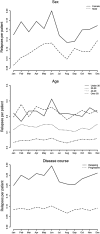Seasonal variation in multiple sclerosis relapse
- PMID: 28424900
- PMCID: PMC5486559
- DOI: 10.1007/s00415-017-8485-0
Seasonal variation in multiple sclerosis relapse
Abstract
Relapses are a characteristic clinical feature of multiple sclerosis (MS), but an appreciation of factors that cause them remains elusive. In this study, we have examined seasonal variation of relapse in a large population-based MS cohort and correlated observed patterns with age, sex, disease course, and climatic factors. Relapse data were recorded prospectively in 2076 patients between 2005 and 2014. 3902 events were recorded in 1158 patients (range 0-24). There was significant seasonal variation in relapse rates (p < 0.0001) and this was associated with monthly hours of sunshine (odds ratio OR 1.08, p = 0.02). Relapse rates were highest in patients under the age of 30 (OR 1.42, p = 0.0005) and decreased with age. There was no evidence of different relapse rates for males compared to females (OR 0.90, p = 0.19). Identification of potentially modifiable environmental factors associated with temporal variation in relapse rates may allow alteration of risk on a population basis and alteration of outcome of established disease once established. Future epidemiological studies should examine dynamic environmental factors with serial prospective measurements and biological sampling. Significant seasonal differences in relapse rates highlight the importance of environmental factors in disease expression and should be taken into account when planning clinical trials in which relapse frequency is an outcome. In addition, identification of potentially modifiable factors associated with this variation may offer unique opportunities for alteration of risk of relapse and long-term outcome on a population level, and suggest putative biological mechanisms for relapse initiation.
Keywords: Epidemiology; Multiple sclerosis; Relapses; Seasonal.
Conflict of interest statement
Conflicts of interest
The author(s) declare that they have no competing interests.
Ethical standard statement
The study was approved by the South East Wales Research Ethics Committee (ref 05/WSE03/111).
Informed consent
All patients provided written informed consent.
Figures



References
MeSH terms
Grants and funding
LinkOut - more resources
Full Text Sources
Other Literature Sources

